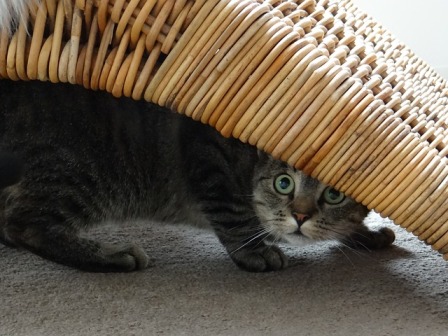Why Do Cats Hide Under the Bed?
Why Do Cats Hide Under the Bed?
Cats are private creatures that mainly bonds with the members of their human family and other household pets. Even then, they usually spend the great part of their time on their own. The same applies to cats in the wild; they are never seen moving around in packs, as dogs do. They prefer their own company, above all. Cats, also, deeply love conformity and stability in their immediate environment. They do not like changes in their daily routine, or the slightest fluctuations in their household. Even minimal changes in their environment, such as the visit of unexpected guests can upset the cat, causing it to hide under the bed. If we want to understand the causes that force the cat to hide under the bed, the article “Why Does My Cat Hide Under the Bed?” gives us some explanations.
Why Do Cats Hide Under the Bed?
Your Cat Just Joined the Family
When you first bring your new cat home, he may immediately retreat to the space under the bed, as far from your reach as he can get. This natural behavior; some cats hide for a few days because their new environment is unfamiliar and scary. An adult cat with past trauma may need more time to adjust than a new kitten who is simply shy and timid. Leave food, water and a litter box in the bedroom for the first day or two while your cat adjusts to life with his new family.Your Cat Likes Alone Time
Every cat is an individual with his own personality traits. Some cats enjoy lots of physical contact and prefer to perch in spots where they can keep an eye on things. Others are more independent or aloof, and spend time away from the hustle and bustle of a busy household. Many cats feel secure in tight spaces, so a cozy spot under the bed works well for a little break. If your cat enjoys an occasional sabbatical under the bed, give him some space; he’ll be back to hang out with the family when he’s ready.Your Cat Is Frightened
A loud noise, such as a dish shattering on the floor, results in varying behaviors depending on your cat’s personality. He may react with nothing more than a feline look of disdain, or if he’s a fraidy cat, he may bolt in terror to hide under the bed for the remainder of the evening. A naturally anxious cat might hide every time there’s a loud noise or an unfamiliar visitor. It’s fine to let your cat retreat to his under-the-bed spot, but don’t punish his behavior. Instead, speak to him in a calm, quiet voice and allow him to emerge from hiding when he’s ready.Your Cat Is Sick
It’s natural instinct for cats to hide illnesses and injuries from their owners. If they’re unable to act normally, they may hide in the quiet, enclosed space under the bed. Pay attention to your cat’s daily habits and watch for changes in his behavior. Signs of illness include eating or drinking less or more than normal, vomiting, coughing, diarrhea or constipation, and lethargy. An injured cat may have visible wounds or engage in other behaviors such as excessive purring or grooming. If your cat exhibits any of these signs, or you suspect he may be injured, take him immediately to the veterinarian.
Cats also use ‘hiding under the bed’ technique as a good tool to overcome the first few days when we are on holiday and travel with them. Until they were accustomed to a new environment, they would search comfort and safety under the bed. If that situation occurred, it would be wise to let the cat establish peace and stability again. The best we could do is to allow it time to adjust to the new surroundings. Some cats enjoy the presence of their owner in these situations. A good way to offer the cat this type of support is to sit beside the bed, reading, watching TV, or making a call. The cat will be happy, because we let her alone, and still, we are there, ready to give it a petting session, if necessary.










